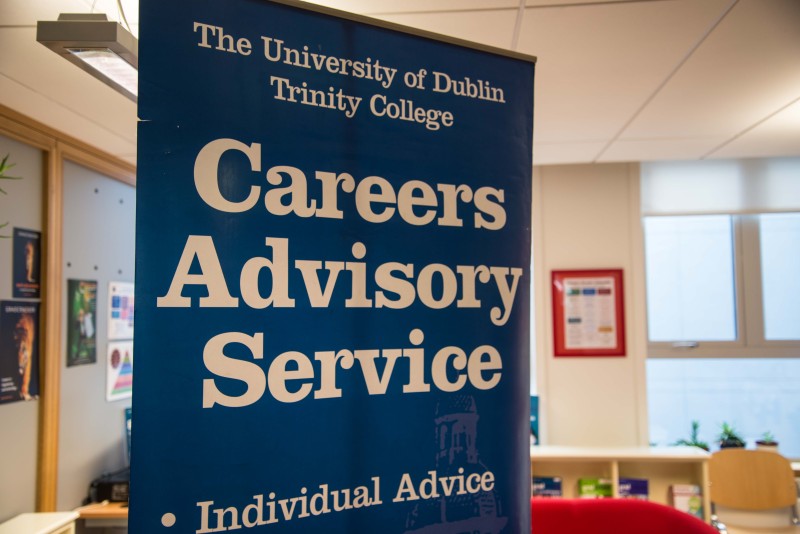Career Pathways, an initiative developed within Trinity to aid students and graduates with disabilities to progress into employment after college, has been awarded the National Ann Beckett Award 2015 from the Association of Occupational Therapists of Ireland (AOTI), for their work in the empowerment and support of Trinity students.
The initiative was developed in early 2014 through a joint effort by the Disability Service, Careers Advisory Service and the Discipline of Occupational Therapy in Trinity, launching in September of the same year. This rapid development was a direct response to the difficulties faced by postgraduate students with disabilities once they’d left Trinity.
The award, named after Ann Beckett, Samuel Beckett’s cousin and former lecturer of occupational therapy in Trinity, came after a successful conference held by the Career Pathways team in the College. The conference aimed to share information about the success of the program with other educational institutions and companies. The AOTI, the organisation that founded the award, granted it to the Trinity initiative because of the “empowerment, enjoyment, outcome and involvement” gained by students who avail of the service.
In an email statement to The University Times, Director of the Careers Advisory Service, Sean Gannon, emphasised that: “Although the economy is showing very strong recovery, students with disabilities still find it very difficult to successfully make the transition from College to employment.”
Funded by the Genio Trust, an organisation that works with both government and philanthropic funders to support disadvantaged people with mental or physical disabilities, Career Pathways seeks to advise and aid students as they progress through their higher education and on to the workplace.
Speaking to The University Times by email, Trinity’s careers advisor for students with disabilities, Eileen Daly, said the project was developed to “provide a flexible and individually-tailored transition service for students with disabilities, which students could access throughout college and in preparation for transition to employment”. Students have the option to avail from as much or as little of the service as they are comfortable with – having the option to choose from workshops that span a weekend or one-on-one weekly meetings with advisors.
Daly added: “Students also attended monthly workshops, which were facilitated by peer supporters and attended a variety of employer events as well as a three-day annual boot camp. Online career development resources were created via a specially designed e-portfolio system.”
Speaking to The University Times, Kieran Lewis, one of the lead occupational therapists on the project, discussed the aims of Career Pathways: “Over the last year and a half, the focus has been on developing how we work with the students.”
Disclosure, according to Lewis, seemed to be the biggest issue for students. The initiative seeks to teach students to speak about how they have managed their disability, rather than speak about the disability itself. Branching away from its initial focus on postgraduate students, the initiative now encourages its students to engage in summer and part-time work while still in college to build up a wider repertoire of skills.
With over 1,400 students currently registered with the Disability Service, Career Pathways has the ability to reach a large audience within the college. Of these students, 126 students have availed of the project over the past year and a half, with over 400 individual meetings held between the students and the Careers Pathways team. Their online e-portfolio system, which aims to provide easier access to services and give an opportunity for the students to log their progress, has reached 61 individual students.
This isn’t the first award that the initiative has won. Last year, at the Graduate Recruitment Awards, it was awarded the Association of Higher Education Careers Services Employability Award. Lewis emphasised how great it felt to be “recognised and singled out”, alongside his colleagues Claire Gleeson and Dr Clodagh Nolan, for the work they’re doing. Gleeson works in the Disability Service alongside Lewis, while Nolan is an assistant professor in occupational therapy in Trinity. These two awards, according to Lewis, capture the two elements of the initiative.
The initiative has had a marked success in support disabled students as they enter employment. Gannon said: “One of the main outcomes of this project has been that with sustained and intensive help, students can successfully communicate their ability rather than the focus remaining on disability. And this, in turn, leads to employment success.”
Staff are already focused on expanding the service further. Progressing onwards, 14 student ambassadors who have previously availed of the program have been elected to act as peer mentors for future students.The project has also made links with employers, something which should contribute to future success. So far, 16 graduate employers have connected with the project, including three large multi-national companies.
With this success, the project has been extended for the remainder of the academic year, to allow for its integration into the Disability and Careers Advisory Services. Lewis feels that the service is extremely important in supporting students, no matter what path they choose to follow after college. Given that the project is “very flexible”, students feel more comfortable in seeking help, Lewis says.
Daly pointed to the variety of ways student can use the initiative to provide them with help and support. For instance, students can attend monthly workshops that are facilitated by peer supporters. Students are also encouraged to attend a variety of employer events, including a three-day annual boot camp.
Indeed, following their current success, the Career Pathways team hope to reach a wider audience, with plans to incorporate a similar project in Irish universities across Dublin. This year, 26 Disability and Careers Service staff from four colleges within the Dublin area attended “Careers Pathways” training workshops. These workshops helped teach these staff the skills necessary to support students with disabilities in their transition to employment.







